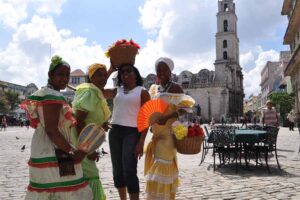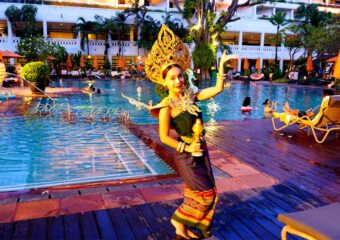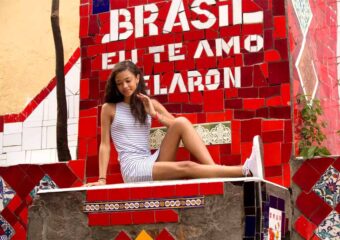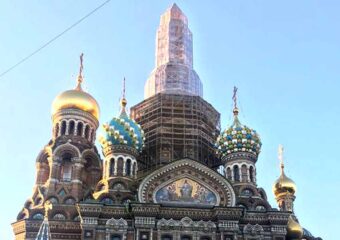GOODBYE CUBA, FORBIDDEN ISLAND
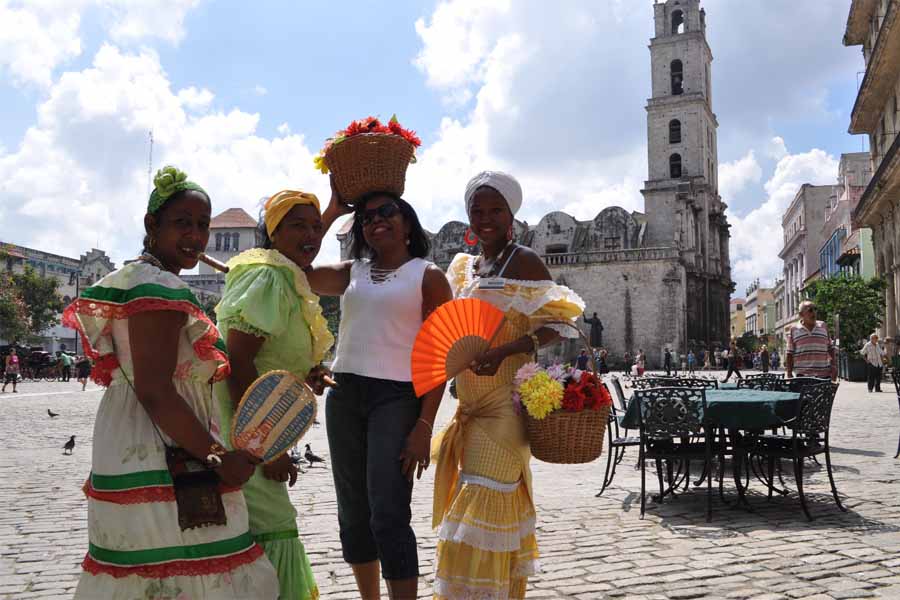
Sunday night was Farewell Night held at the Laguna, on the beach. That was also Anniversary Night for the AMHE (40th) and for the AMHE-NJ (24th). The band stopped playing at 11:30. Some revelers evacuated toward the lobby disco. Most went back to their baronial rooms at the silken beachside Melia’s Tryp Peninsula where we sojourned.
We were all exhausted. It was time to pack. Our luggage would be picked up, from our doorsteps, at 6:00 a.m. At 8:30 a.m., after a lengthy checkout process, all 80 of us, were already on board of the three buses, heading toward Jose Marti International Airport, nine miles from the center of Havana, but at a two-hour and forty-minute drive from Varadero, ground zero of our weekend activities. It was Monday, Columbus Day. Our caravelle had to sail again…
Members, colleagues and friends of the Association of Haitian Physicians Abroad (AMHE), of all races and creed, led by the New Jersey Chapter, took this anniversary travelearn to the shores of a brethren nation, a strong link of the Caribbean African diaspora, Cuba. Modern Cubans see and tout themselves as Afro-Latins and gave us a reception beyond our wildest expectations.
Yes, to their eyes, ours was a large delegation, the largest seen by our U.S-based tour operators. Also the largest led by the on-the-ground guides of the San Cristobal Travel Agency in Havana who took us around the capital city, around Matanzas and its African heritage, and to the Varadero peninsula, 140 miles away. They were used to 20 guests, we taught them how to handle 80. They were thankful. For the tips as well.
For all 80 of us, on this Monday, it was clear that we were living the last flashes of a sublime, unique, unforgettable moment, suspended by the threads of time, that we will never be able to recreate. It was a week of impossible magic, a tour for the history books, an emotional spell of self-identification. Paraphrasing Julius Caesar, we could say, “We came. We saw. We learned”. Alea jacta est. And we grandly celebrated the longevity of the AMHE, at its milestone.
……………………….
We arrived to the island with queries, we left with retorts.
Cuba, since the 1959 revolution, has set itself on the path to universal education and healthcare. It has reached both goals by achieving the #1 spot in the world for literacy (99.3%), by compiling among the best vital statistics on this planet, and by acquiring the status of second best in terms of doctor/citizens ratio (1/170).
Cuba effectuated its high standard healthcare delivery by creating a single payer system and by taking the words business and middle-man out of its healthcare products. Preventive care, community medicine, multi-disciplinary integrative methods, evidence-based best treatments, most productive algorithms, elimination of futile medical services stand as means to the end. Education is key. Research for research, not necessarily for commercialization, is encouraged.
The US spends 20 times more per citizen, in terms of healthcare dollars, and reaches lower goals. For America to reach equal targets and fix its wasting system, healthcare will have to follow the same path of being a non-profit salaried occupation with a mended malpractice system, instead of a high-income yielding business, with tort attorneys laying in wait. “Care first” must be its motto.
Twenty three years after the fall of the Berlin Wall (November 1989) and the ensuing disintegration of the Communist block, Cuba is one of the four self-identified Marxist countries still standing. The other ones are China, Vietnam, and North Korea. Obviously, there is no much left of state-planned economy (and therefore communism) in Shangai, China, and in Hanoi, Vietnam. Both countries are close economic allies of the U.S. In all practicality, North Korea and Cuba harbor the two truly surviving communist systems in the world. They share another defining characteristic: they are both under an US-led economic embargo.
Cuba has reached the demographic parameters that would allow the island-nation to transit safely into a market-oriented economy, as Russia and Poland have done so successfully. It is argued that Cuba is still a communist land, with limited political alternatives, because of the embargo maintained in place by the South Florida political muscles of the Cuban exile community. The current Cuban government refuses to hand the reins of the country back to those who they think maintained the perennity of debauchery, corruption, inequality and racism on the island before the revolution. “So goes the economic embargo, so goes communism in Cuba”, think the Cubans in Havana.
However, the Cubans are not truly happy under the current system. They give high marks to their healthcare, educational systems and other social entitlements, but they are tired of vouchers, rations, and quotas. They want to be fat and free, like the Americans. How could they bless the years of painful shortage and famine, a time identified historically as the Special Period (1991-1998)? This period comprises the years that followed the dissolution of the Soviet Union and the abrupt curtailement of the assistance from the Kremlin, which in actuality was subventioning the Cuban economy.
One outcome is sure, 11 million Cubans who adore everything American, are not likely to propagate the virus of communism to the heart of 320 million die-hard individualists, or inject irreversible collectivization in a globally owned 17-trillion dollar free market system.
During our week of travelearn to the island republic of Cuba, our delegation lived a suspended reality that no photographs, no video recording, and no travelogue can render. Only those who lived it, will forever carry this treasure in their heart and soul.
……………………..
At Jose Marti International Airport, one of our youngest colleagues could not find his passport. He would have to stay behind until the SEALs, special forces, come to rescue him under the cover of the night. But, while time was running out for him to check-in, he found the precious document at the bottom of his… luggage. Once again, it was more fear than damage. The delegation remained whole.
The ABC-chartered American Airline flight # 9427 left Havana at 1:30 p.m. The staff hardly had the time to serve us some drinks. By 2:30 p.m. we were on the tarmac at Miami International Airport. Sorrow overwhelmed our hearts. It was time to part. We kissed and hugged. Most of us promised to meet again next year, in October, for a recreation of the magic. Everyone wanted to be sure they see “their” immortalized pictures online. Customs made sure that we were not carrying Cuban cigars or rum.
I hurried to the check-in counter at United Airlines. Flight 1186 took off at 4:55 p.m. and landed at Liberty International at 8:00 pm. Mustafa, my limo driver, was at caroussel #7 waiting. He knew my bag was coming there. I fell asleep on the back seat of the Lincoln Continental…. and dreamed of a free Cuba, a forbidden island that will no longer be forbidden.
………………………
Travel is the best university; it unites our species in the concert of our similiarities. Once again I took a trek on this blue planet shared by the human gentry. In Cuba, I did not run into hords of roaring blood-thirsty communists. I found a highly educated and cosmopolitan crowd of dreamers and hopers who don’t want to return to the failures of their common past, but who see the constraints of their current lives as adverse to their future. Their leaders agree. On this side of the Strait of Florida, we deplore and condemn these leaders’ excesses.
Thanks to the people-to-people program, we learned. In Cuba, live men and women, like us in the U.S, who, like us, love baseball, nightclubs, and beaches. Like all of us, they care about health, long life, and the future of their children. Like us, they don’t spend their time antithesizing communism versus capitalism. Like us, they don’t care. Like us, they are in a relentless pursuit of happiness, that may go through the path of capitalism, the best economic system that has ever been standardized, the one system that creates a world where all dreams are reachable, even the one of owning a cell phone and a plasma TV.
Nothwistanding, the social nets must stay in place. May we understand that we may live in a two-million dollar house, we may drive 100-thousand dollar automobiles, not be because we need them, but because we want them, or just because we can. May this remain our take-home: some people do well with just $22 a month. We must learn how to share; that has been mom’s teaching.
Mustafa took my bag all the way to my doorstep, I was too exhausted to carry it. He wished me good night. Since then I have been home in Warrenville, back to my rat race.
I am a citizen of the world. If Haiti is my homeland, the world is my patria, and Warrenville is my home. It feels so good to be back home.
Until the next adventure, it was The Traveller…
(The Traveller, Thursday, October 18, 2012)
*Join the Travel Club for Friends and Colleagues:
World Travelers Facebook group

